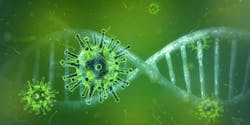How is Coronavirus spread?
Most often, Coronaviruses spread from person-to-person during close contact, and person-to-person spread is thought to mainly occur via respiratory droplets produced when an infected person coughs or sneezes, according to the Water Environment Federation (WEF). Close contact generally does not include brief interactions, such as walking past a person.
It is currently unknown if viral particles can be aerosolized from water or suspended into air after settling and remain infective, according to WEF.
According to the European Centre for Disease Prevention and Control, there is currently no evidence to support airborne transmission of the Coronavirus (COVID-19).
Is Coronavirus present in wastewater?
Recent information suggests that COVID-19 may be transmitted through the fecal-oral route. The Occupational Safety and Health Administration (OSHA) recommends that workers handle solid waste contaminated with Coronavirus as they would other regulated Category B medical waste.
Previous studies investigating persistence of coronavirus surrogates and SARS in wastewater highlight that in the absence of disinfection, the virus can survive in wastewater from hours to days.
According to WEF, wastewater workers do not need to take special precautions.
Despite this, workers are advised to follow routine practices to prevent exposure to wastewater, including using the engineering and administrative controls, safe work practices and personal protection equipment (PPE) normally required for work tasks when handling untreated wastewater.
Growing concerns
According to WEF, absenteeism could affect drinking water and wastewater system operators and their capability to operate and maintain their systems adequately, thereby increasing the risks to public health.
In the event of a severe pandemic, absenteeism would increase from illness, the fear of infection and the need to care for ill family members. Absenteeism would also affect workers from other essential and interdependent sectors such as the transportation, power and chemical sectors. This could ultimately adversely impact services such as delivery of chemicals and other essential materials and supplies.
Additional information on COVID-19 is available here.
American Water Works Association (AWWA) also has the following resources to help water utilities to be prepared:
